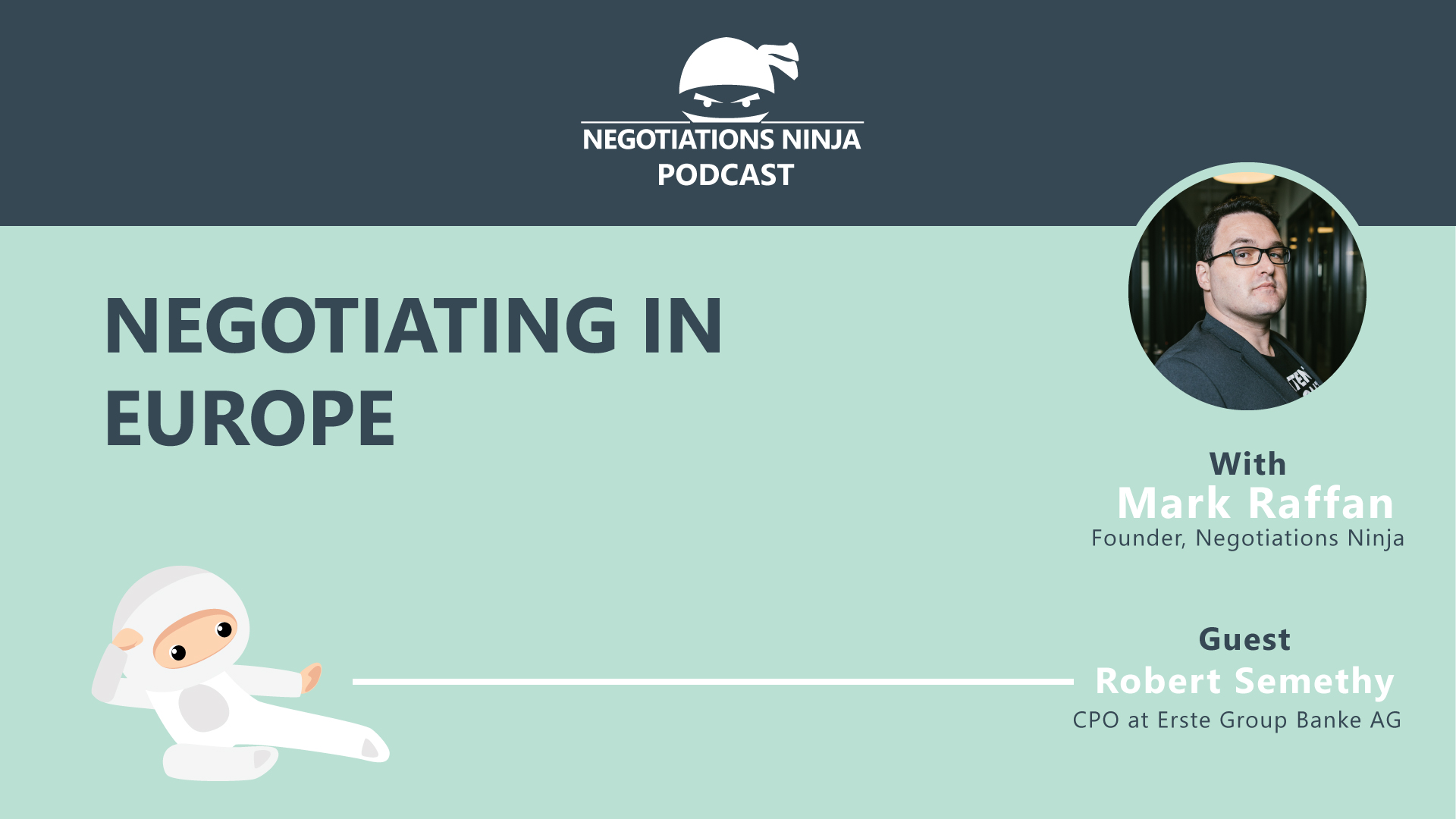Robert Semethy joins us in this episode of Negotiations Ninja—all the way from Vienna, Austria. Robert is the Chief Procurement Officer at Erste Banke—which is now celebrating its 200th year. We talk about differences in procurement and negotiation between Europe and North America. What do we need to know if we’re working or living in Europe? What are the primary differences from the viewpoint of an American now living in Vienna? How do we succeed professionally once we understand the differences? And what should we continuously notice when doing business in Europe?
Robert is clear that there’s no homogenous negotiating style in Europe, just like there’s no one style in North America. Canada is different than the United States and the same goes for all the cultures that make up Europe. What’s the role of strict rules in Europe around bribery and corruption? What’s the best venue for the negotiation’s first meeting or engagement? Over a coffee or in a formal boardroom? What role does Europe’s long history have in how North Americans do business with European procurement professionals? What does an international style or international norm for negotiating look like? Are we moving in that direction? Listen to this informative episode to learn more!
Outline of This Episode
- [2:42] How Robert Semethy ended up in Austria
- [4:44] What are the biggest differences in styles?
- [7:38] Addressing someone on a first name basis
- [11:55] Why is an international style of negotiation becoming the norm?
- [13:25] Will BREXIT affect international negotiation styles?
- [15:10] What can we learn from European negotiators?
- [19:53] How to develop a rapport with someone a European
- [22:36] Advice for Americans doing business in Europe
- [25:58] What is the biggest lifestyle difference?
- [27:48] Norms are driven by where the parent company is located
The differences between European and American negotiators
Robert points out that North America and Europe have some cultural similarities but are not homogeneous. Just like you can’t say that “All Americans are the same” it cannot be said that “All Europeans are the same”. Robert has noticed that Romanians embrace a more Latin feel. Hungarians operate differently as well. Germans are quite formal. Each country has different languages and histories that impact their negotiation style.
In general, Europeans are more formal in dress and speech. They default to “Mr. or Mrs.” whereas first names are for friends and family. English speakers gravitate towards first names rather quickly and lean more towards informality. Addressing a European negotiator on a first name basis may not be considered offensive. However, addressing them formally shows that you have an appreciation for their culture and social mores.
Another difference? Robert points out that you shouldn’t expect much to happen in August as far as business negotiations because Europeans place high importance on taking a vacation. Similar to how Chinese companies take ample time off around the Chinese New Year. They take time away from work to come back refreshed and rejuvenated—whereas Americans seem to be all about the hustle.
The international negotiation style that’s becoming the norm
Robert points out that if you’re operating in a multinational business with multinationals, an international norm has developed over the years. That norm seems to permeate negotiation and business styles. He notes that rules and regulations are beginning to extend beyond traditional boundaries and becoming a widespread norm—becoming more and more a part of globalization.
Robert believes that if you’re operating internationally, you’re probably also speaking English. And that also brings a sort of a norm to how you’re operating and you’re behaving. Even popular culture is converging and becoming much more international and internationally available.
How to develop a rapport with your European counterpart
Robert shares that that process of developing a rapport with a counterpart varies widely from country to country. In Germany, some people sit next to each other and work together for 20+ years who are still on a last name basis. In Austria, you can sit down to a cup of coffee and quickly develop a relationship. Romania operates in a similar fashion. So how do you bridge the gap? In the more formal countries, Robert recommends starting with more formality and letting them take the lead on loosening that.
If you’re in a long-term placement in another country, Robert emphasizes it’s important that you begin to learn their language. If it’s not an English speaking country, you’re effectively illiterate. It’s also important to cultivate an understanding of the culture that you’re immersed in. So you must appreciate the location, the food, the lifestyle, the people, and the culture you’re lucky to be a part of—and integrate yourself whenever possible.
Robert notes that there is a completely different world outside of the United States and that you must recognize and appreciate that fact to succeed.
Negotiation norms are driven by the headquarters of the company
Robert also points out that a company that is headquartered in the US is going to have a US style and culture—no matter where a subsidiary is located. So even if you have a subsidy in Romania or Austria or Hungary, that subsidiary is going to have a US style because the governance is from the US processes and training. Likewise, an Austrian based company with subsidiaries in other countries will have an Austrian flavor to it. Robert states, “Where the mother company is located drives much of the culture that you’re going to experience at an organization.”
Connect with Robert Semethy
- Connect on LinkedIn
Connect With Mark
- Follow Negotiations Ninja on Twitter: @NegotiationPod
- Connect with Mark on LinkedIn
- Follow Negotiations Ninja on LinkedIn
- Connect on Instagram: @NegotiationPod




